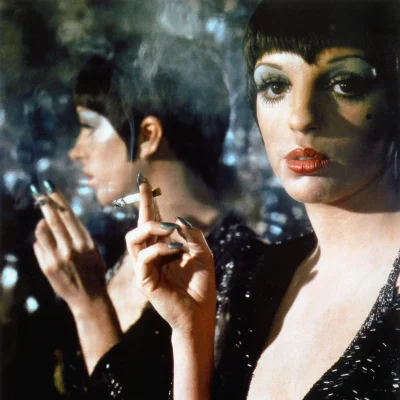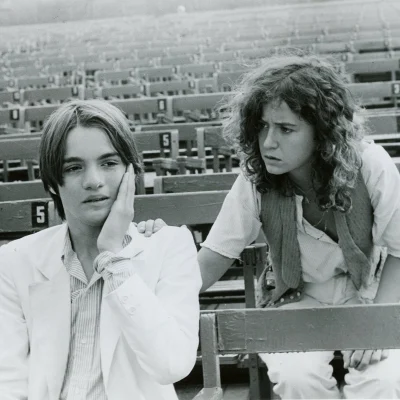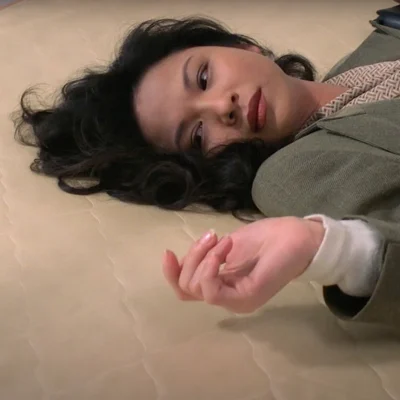
Roger Deakins' passion for film — a passion that's led to 15 Oscar nominations and two wins for Best Achievement in Cinematography — began more than half a century ago in Torquay, the traditional seaside town in South West England where he was born. In the late '60s, he would travel to the Bath Academy of Art to study graphic design, and then, photography. But during his breaks from school, Deakins would return home, where he inadvertently fell in love with cinema.
"I joined a little film club they used to run in Torquay in the winters. They put up a little temporary screen, and they had a 16mm projector, and they'd show a classic movie — well, then contemporary films, but they're now classics," he recalls. "I'd seen everything from Alphaville to Last Year at Marienbad — loads of movies — and I was really turned onto movies then."
Deakins eventually attended England's newly opened National Film School. Since then, he has shot dozens of films, including The Shawshank Redemption (1994), Fargo (1996), O Brother, Where Art Thou? (2000), The Assassination of Jesse James by the Coward Robert Ford (2007), Skyfall (2012), Blade Runner 2049 (2017), and 1917 (2019), the last two of which earned him Oscars. He is widely regarded as one of the most masterful cinematographers in the history of cinema.
Below, Deakins shares with A.frame five films that had the greatest impact on him, though he may not always be able to put into words exactly why. "When films are really good, you can't talk about them, because they're doing something that is not explainable with words," he hems. "It is a combination of images, and sounds, and words, and music — the works. Everything! It's almost a religious experience."

Directed by: Peter Watkins | Cinematography by: Peter Bartlett
The War Game was one of the first films I saw in that film society. It won Best Documentary at the Academy Awards that year but it's not a documentary. It's what would happen if a nuclear bomb fell on London. It's a black-and-white recreation of the breakdown of society after a nuclear attack, and to watch it as a teenager during the Cold War, as it was then, was pretty intense. It had such an effect on me. I've always remembered that film and the style in which it's done. People think that the handheld camera and documentary realism is something new, but that film is the ultimate in shooting that style, as though you are just grabbing things. It's actually all constructed, but it's all constructed with non-actors, with real London people, in different parts of London.
It's a pretty amazing film. You could say it's dated now, because it's grainy and it's black-and-white, and it's 16mm, but it's still so effective to watch. It's still not really been beaten in terms of its visceral connection to something like that.

Directed by: Jean-Pierre Melville | Cinematography by: Pierre Lhomme and Walter Wottitz
Army of Shadows, I also saw in that film club. What stuck with me is the sense of mood and the sense of place. And the absolutely uncluttered, direct way it shows you things that make it so haunting and so difficult to watch at times. There's a particular scene in it where the French Resistance have got this guy that sold them out, they take him to this safe house, and they tie him in a chair. They stand around him discussing how they're going to kill him. Right in front of him! They can't shoot him, because it would make too much noise, so what are they going to do? They're going to get a garrote.
It's horrifying. But what makes it even more horrifying is it's shown in one wide shot, and you can't escape it. You realize that you don't have to do fancy camerawork and fancy lighting; sometimes it's the matter-of-factness of something that makes it incredibly effective. That's the strength of the scene, really. 'Less is more,' is what I say a lot. Less is more, but there's precision in the way the camera moves. In some scenes, the camera's moving and it's going with characters, but it's all done with so much thought and so much attention to detail. It's a wonderful movie.

Directed by: Andrei Tarkovsky | Cinematography by: Aleksandr Knyazhinskiy
What's really great about Tarkovsky's films is they're more than a narrative. In fact, sometimes it doesn't seem to be a conventional narrative. It's more about exploring a situation. So, I would say Ivan's Childhood — his first film — and Stalker, which is a really interesting film. It's based on a book by Arkady and Boris Strugatsky called Roadside Picnic, about aliens visiting Earth and having a picnic, and leaving behind trash and how that trash affects human beings.
Stalker is very pertinent now, actually. It's about this closed-off area where they think there's been an alien invasion. It's some strange, mythical place. And so, the film is about this journey into this forbidden zone. It's about the nature of belief. Well, that's how I read it. I'm sure other people read it a different way.
So much is done with the camera moves, holding a shot until it becomes something more than what you expected of it. Sometimes you can hold a shot and you think, 'Why are we holding this shot?' And then, it becomes something else. It becomes really tense. And Stalker is absolutely that to a T — the way he creates this tension without really anything happening. Nothing happens in the film, but it's absolutely riveting. It's really strange and disturbing. And so much is in the minds of the characters, and then, your mind watching it. I think it's great.

Directed by: Sam Peckinpah | Cinematography by: Lucien Ballard
I really like Westerns, so I don't know whether to say Once Upon a Time in the West or The Wild Bunch. I love them both, but I think I'd have to say The Wild Bunch because Peckinpah is one of the greatest directors to ever live. Some of his films are absolutely masterpieces, and I suppose The Wild Bunch is probably the best of his career.
It's so angry. But, at the end, it's so much about the world passing by. It's about the world changing. Every one of us in our own lifespan go from one world to another. Peckinpah said it wasn't about Vietnam, it wasn't about contemporary society, but it damn well reads like it. There was the outlaws and there was the capitalists, and they would rob the banks and take the money. There was an order between these struggling sides, but in the end, you are left with these people that can't understand the world has changed so much. They can't put it together. The tradition of the West has changed, and I find that really powerful. It's done in quite a few films, but I think The Wild Bunch does it really well.
Directed by: Michelangelo Antonioni | Cinematography by: Aldo Scavarda
L'Avventura is one of my favorite films. Antonioni does something that's not literature. It's not people talking. He creates something that is more than... It's film. He can put a shot in a scene, or a scene within a series of scenes, that is not driving the narrative, but it's damn well telling you something about what he's trying to put in front of you. It's somehow adding to that experience of the storytelling in a really interesting way. He's done it in all his films, but L'Avventura is particularly mysterious. You can't put your finger on it, but it draws you in, and it's really good. I can't explain it because it is not like reading a book or something. It's film. It's what film can do, which I think few filmmakers can actually achieve, but Antonioni did. And certainly Melville and Tarkovsky did as well.






